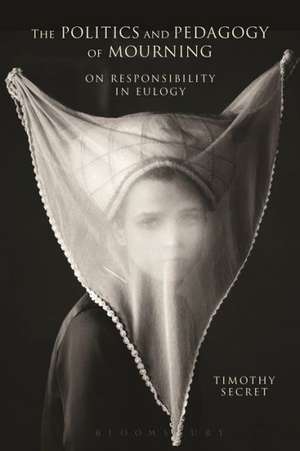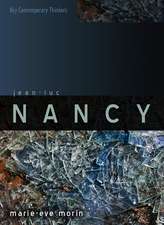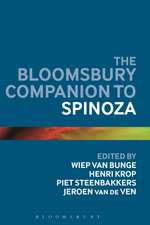The Politics and Pedagogy of Mourning: On Responsibility in Eulogy
Autor Timothy Secreten Limba Engleză Hardback – 25 feb 2015
| Toate formatele și edițiile | Preț | Express |
|---|---|---|
| Paperback (1) | 258.51 lei 6-8 săpt. | |
| Bloomsbury Publishing – 19 apr 2017 | 258.51 lei 6-8 săpt. | |
| Hardback (1) | 775.83 lei 6-8 săpt. | |
| Bloomsbury Publishing – 25 feb 2015 | 775.83 lei 6-8 săpt. |
Preț: 775.83 lei
Preț vechi: 991.66 lei
-22% Nou
Puncte Express: 1164
Preț estimativ în valută:
148.50€ • 161.36$ • 124.82£
148.50€ • 161.36$ • 124.82£
Carte tipărită la comandă
Livrare economică 21 aprilie-05 mai
Preluare comenzi: 021 569.72.76
Specificații
ISBN-13: 9781472575142
ISBN-10: 1472575148
Pagini: 296
Dimensiuni: 156 x 234 x 28 mm
Greutate: 0.64 kg
Editura: Bloomsbury Publishing
Colecția Bloomsbury Academic
Locul publicării:London, United Kingdom
ISBN-10: 1472575148
Pagini: 296
Dimensiuni: 156 x 234 x 28 mm
Greutate: 0.64 kg
Editura: Bloomsbury Publishing
Colecția Bloomsbury Academic
Locul publicării:London, United Kingdom
Caracteristici
A new account of the logic at work in deconstruction as an articulation of different discourses that allows for a unique and fragile mode of communication between them
Notă biografică
Timothy Secret is a Senior Lecturer in Philosophy at the University of Winchester, UK and was an AHRC/BBC Radio 3 New Generation Thinker 2012.
Cuprins
Preface: The Proffered Refuge of the Dead (or 'Why Psychoanalysis')1. Becoming Mortal1.1. Learning to Die 1.2 The Anticipation of Death (on Heidegger)2. Articulation 2.1 The Work of Deconstruction 2.2 Hinges and Articulations3. The Ethics of Vulnerability3.1 A Wounding of Language 3.2 Death in the Order of Exposition4. The Scene of Writing4.1 The Psychographic Metaphor4.2 Psychic Sketches5. Mourning or Melancholia5.1 Psychoanalysis and Mourning5.2 The Ghosts of Budapest6. The Address of Eulogy6.1 The Most Common of Experiences6.2 The Simplest Thing6.3 Memoires6.4 The World is GoneConclusion: Closing the TombAppendix: The Exceptional Solitude of Abraham and TorokBibliographyIndex
Recenzii
Timothy Secret's book addresses a very important area of Derrida's work that has thus far not received justly-deserved attention. The originality of Secret's project and its most significant impact, I believe, rests on the role accorded to Derrida's eulogies as political acts "offering a pedagogy in responsibility.
Timothy Secret's book is quite remarkable: erudite, well written and argued, conceptually strong and original, it sheds a completely new light on a decisive moment of contemporary philosophy. There is little doubt that it will form an important contribution to debates about the work of the philosopher Jacques Derrida, but also the relationship between ethics, politics, ontology, psychoanalysis, and, not least, its designated "object", the existential and moral phenomenon of mourning.
Timothy Secret has accomplished a great deal with this text. For those who already turn to the work of Jacques Derrida or Sigmund Freud to think about the ethics and politics of mourning, this work will be invaluable. For those who are skeptical of deconstruction or psychoanalysis, it will serve as a refreshingly clear and convincing argument that they should rethink their positions. For all who find themselves reflecting on the sobering if not impossible responsibilities of speaking about the dead, Secret's text will become an irreplaceable intellectual companion.
Combining eloquence and sharp philosophical insight in equal measure, Timothy Secret weaves a fascinating commentary on the treatment of questions of death and mourning in the work of four of the twentieth century's most prominent thinkers. His book represents a major contribution to our understanding of the ways in which Freud, Heidegger, Levinas and Derrida approach that most ineluctable of issues - our common mortality.
Secret is a sensitive and illuminating reader of Derrida.
[T]his is a book to read.
The challenge to develop a significant learning experience through Derrida's eulogies could be difficult, but it is not impossible, and Secret's book is an essential tool to begin the process and overcome some of the barriers. The author's passion for the topic is evident; I believe this book is relevant and extraordinary, and it is an outstanding addition to the literature in the field of death and dying. For all of these reasons I recommend it to those interested in death, mourning, and eulogy as a way to memorialize those who have gone before us.
Timothy Secret's book is quite remarkable: erudite, well written and argued, conceptually strong and original, it sheds a completely new light on a decisive moment of contemporary philosophy. There is little doubt that it will form an important contribution to debates about the work of the philosopher Jacques Derrida, but also the relationship between ethics, politics, ontology, psychoanalysis, and, not least, its designated "object", the existential and moral phenomenon of mourning.
Timothy Secret has accomplished a great deal with this text. For those who already turn to the work of Jacques Derrida or Sigmund Freud to think about the ethics and politics of mourning, this work will be invaluable. For those who are skeptical of deconstruction or psychoanalysis, it will serve as a refreshingly clear and convincing argument that they should rethink their positions. For all who find themselves reflecting on the sobering if not impossible responsibilities of speaking about the dead, Secret's text will become an irreplaceable intellectual companion.
Combining eloquence and sharp philosophical insight in equal measure, Timothy Secret weaves a fascinating commentary on the treatment of questions of death and mourning in the work of four of the twentieth century's most prominent thinkers. His book represents a major contribution to our understanding of the ways in which Freud, Heidegger, Levinas and Derrida approach that most ineluctable of issues - our common mortality.
Secret is a sensitive and illuminating reader of Derrida.
[T]his is a book to read.
The challenge to develop a significant learning experience through Derrida's eulogies could be difficult, but it is not impossible, and Secret's book is an essential tool to begin the process and overcome some of the barriers. The author's passion for the topic is evident; I believe this book is relevant and extraordinary, and it is an outstanding addition to the literature in the field of death and dying. For all of these reasons I recommend it to those interested in death, mourning, and eulogy as a way to memorialize those who have gone before us.
















